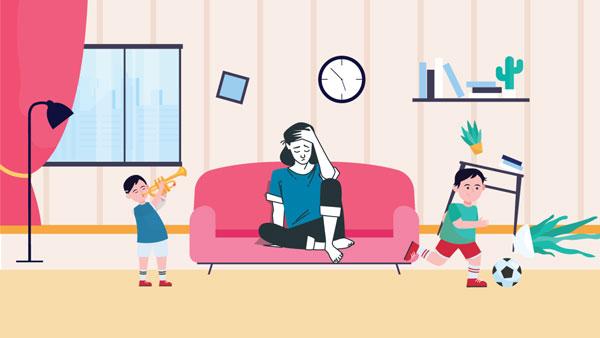Until kids mature, definitely parents are responsible for them. If parenting task is done in a well-organised manner without causing overstress, it’s rewarding. But if this is done by considering the roars and comments of the surroundings, it can lead you to hit your head against the wall. If you are one of such parents, relax! After reading this up-write, you will be able to control the situation very sophisticatedly. In this article, we are going to unfold the challenges of parenting, how to overcome those challenges, what traits you have to develop in your kid and many more. So, keep reading!
Why is parenting so challenging?
“Parenting is a next-level combination of simultaneous feelings of pain, fear, overwhelming and utter joy.”



Parenting itself is not as tough, all the game is of mindset. Actually, parents try to be super mom and super dad, but kids have their own nature, they don’t come into this world with a guidebook, so the problem occurs when the situation goes against the expectations.
In the back days, there were very few challenges of parenting for parents compared to this era. Now the world has modernized, kids use mobile phones and the internet, and they come to know the things that parents may not tell them at that age. So, if you are feeling unsatisfied with your kid’s behaviour and always curse yourself by saying, “This is all my fault”, or “Have I ruined my child’s life?”, first relax! Nothing is perfect in this world, you know ALFRED ALDER said:
“Have the courage to be imperfect.”



So, let’s discuss why parenting is difficult.
What are the problematic factors that have put parents into this ridiculous perfection dilemma.
i. Societal pressure: Parents assume that they are being judged for their parenting by strangers, parents of their kid’s friend, their relatives and other people they are in touch with. This feeling lose their confidence, feel incompetent, and fall prey to an inferiority complex, ultimately making children feel ashamed.
➔According to a survey (2016), 90% of parents feel judged (90% of mothers and 85% of dads).
- 48% of moms and 24% of fathers felt prosecuted by strangers
- 33% of moms and 29% of dads felt judged by other parents ( parents of friends of their kids, by relatives, parents friends, etc.)
ii. Work-life balance: The biggest problem is this fast pace of life. Parents are busy making a good livelihood, and can’t give enough time to parenting, which is a cause why children are becoming disobedient and ill-mannered. Parents are often busy with their business meetings and maids are taking care of their kids, honestly.
But you know, earning money is also crucial, how children will develop well without the basic necessities of life. So, work-life balance is really a challenge for parents.
iii. Digital influencers: Sometimes influential lectures for parenting create a sense of comparison among parents. They try to compare their home situation with the dictated happy family stories, and eventually delve into more depression.
iv. Educational expectations: Unrealistic hopes always lead a person towards anxiety, discomfort and dissatisfaction. What most parents do is that they expect too much ( school grades, etc.) from their kids, even if it is out of their approach. When kids can’t access the target, parents without knowing the reality, just start thinking that it’s their own fault, there’s something missing in their parenting, or things like that.
What are the challenges of parenting?
“Don’t worry that children never listen to you, worry that they are always watching you.”
Robert Fulghum



A few years ago, a study was conducted to check out parental behaviour, and they concluded that parenting behaviour is triggered by a tiny part of the brain ( Hypothalamus), and is controlled by galanin ( a neuropeptide involved in memory, attention, and learning).
There are some challenges of parenting that trigger the emotions of parents.
Let’s discuss them one by one;
- Disciplinary issues
- Sleep-wake cycle
- Mental health awareness
- Balancing freedom and control
- Dealing with external influences
These challenges below make them anxious about their parenting role.
i. Disciplinary issues. Disciplinary issues may include the disorganization of kids. For example, they don’t clean their room, keep fighting with siblings, snatch the envelopes, etc. This is really a major test for parents. These situations often end in a useless argument, all of the family members go out of the house in a bad mood and feel low all day long.
ii. Sleep-wake cycle. Maintaining the sleep-wake cycle of newborn babies is a hard situation for new parents because they wake up when they try to sleep. Apart from looking after the baby, they feel chronic fatigue, and can’t perform their other daily tasks well.



iii. Mental health awareness. Some persons are usually short-tempered, they are impatient and get furious in no time without knowing the depth of the situation. But it will impact kids’ mental health ( their learning, self-esteem, confidence, etc. ).
iv. Balancing freedom and control. Parents always remain curious and keep weighing the pros and cons of things related to their kids. So, this is the biggest dilemma for parents about which things they should allow and from which they should warn their kids. But, you know children are so smart that they don’t like to be restricted ( and argue with parents), so it could be challenges of parenting especially for parents.
v. Dealing with external influences: External influences ( religion, schooling of kids, the support system of partners, etc) are another factor that adds to the challenges for parenting. Moreover, when parents see external families happier than them, it creates a sense of comparison and possessiveness, but I think it’s a natural thing because everyone wants their loved ones happy and enjoying life.
What do parents struggle with the most?
Every parent wants the best for their kids, they try to provide them with all within their approach. Irrespective of all the sacrifices, still parents face many other factors that kids may never even come to know, such as;
i. Fear. Parents constantly keep playing the “What if” game, which makes them think of the worst scenarios, for example, if something happens to my kid, have I made a wrong decision for my child? Am I a good dad/mom? And these insecurities engulf the happiness of families like a wood borer.
ii. Guilt. Even after pondering for hours on a single decision, parents still feel that they have done something wrong. Alas! They feel that their decision-making power isn’t good enough to make a perfect decision for their children. However, this low confidence of parents makes kids feel unstable and insecure.
iii. Patience. We all know that some kids are so stubborn they don’t listen to anyone and ruin the peace of parents. But, as a parent, all they can just do is do some counselling and observe patienyly, which is no doubt a real struggle.



iv. Maintaining healthy relationships. While taking care of all the matters ( job, taking care of kids, their studies, health) perfectly, it’s challenging to maintain a healthy relationship with your kids and your partner. Sometimes situations become so tense that people start blaming each other, ultimately making it worse.
How do you overcome and embrace the challenges of parenting?
You will have seen certain families that are living happily without any conflicts between parents or siblings. They are all cooperative, caring and loving, this is all due to positive parenting behaviour (not perfect). So, to assist you in building a happy family structure, we are going to discuss some practical tips that will definitely prove helpful in challenges of parenting and regaining your peace of mind.



i. Lessen your expectations. The less you will expect, the less you will get hurt. Some parents expect more than the capacity of kids ( e.g.; in grades), so figure out the mental extent of your kids and try to handle them accordingly.
ii. It’s okay not to be okay. Don’t run after perfection, in the end, all you will get is anxiety, depression and uneasiness. Take a deep breath and accept the reality, there’s no fault in you or your kid, you are doing your job perfectly.
iii. Don’t place too many restrictions. Don’t let your kids think that you are bounding them, keep an eye on their activities silently and counsel them from time to time.
iv. Adaptability with your partner. Parenting is a teamwork, a single parent can’t perform as perfectly, as both parents can. No doubt there would be some disagreements on certain points ( style, time, diet, etc), But that’s all completely okay. So, discuss with your partner and make certain points, which will reduce your stress and frustration.
Why does embracing challenges of parenting matter?
Embracing the challenges of parenting is important. It helps parents to build up parent-child relations and fosters a healthier and more supportive environment for children. Here are whys:
Personal growth
- Self-awareness: Facing parenting challenges encourages self-reflection. It is good for parents to understand their talents and weakness.
- Resilience: Overcoming obstacles builds resilience. And parents can overcome stress and adversity more smoothly.
- Patience: Dealing with difficult situations requires patience. It’s beneficial for building patience.
Building up parent-child bonds
- Bonding: Solving parenting problems together helps to build the bond between parents and children.
- Trust: Trust bridges bonds. Children can trust their parents more when they see parents handling challenges.
- Communication: The key to overcoming difficulties is open and honest communication, which improves overall family dynamics.
Receiving positive feedbacks
- Problem-Solving Skills: Embracing challengs is the best way to fix challenges of parenting. It’s also for Parents to demonstrate effective problem-solving skills.
- Emotional Regulation: Handling challenges calmly shows the right way to manage their emotions.
- Adaptability: Handling challenges is a process of cutivating adaptability. It’s a good way for parents to present how to adapt to changing circumstances.
Creating a friendly environment
- Empathy: Experiencing challenges fosters empathy. Parents can know their children’s struggles.
- Support and care: Parents can seek support from friends, family, or professionals, which helps parents build a broader network of care.
- Safety: Overcoming challenges ensures a safe home environment for children.
Long-term benefits for children
- Resilience in children: Chidlren can learn resilience from their parents.
- Self-esteem: Chidlren can boost their confidence by seeing how their parents handle difficulties.
- Life skills: Children can learn valuable life skills, such as problem-solving, adaptability, and emotional regulation.
Elevating expectations
- Imperfection acceptance: Embracing challenges helps parents and children understand that making mistakes is acceptable.
- Growth mindset: It fosters a growth mindset. Parents can understand challenges are opportunities for learning and development.
- Real-life preparation: Understanding difficulties are a natural part of life can help child better prepared for their life.
Community and social support
- Shared experiences: Sharing challenges with other parents can build a sense of community and mutual support.
- Guidance: Parents can provide guidance for others who have experienced similar issues.
- Reducing isolation: Discussing and addressing challenges with others reduces the feeling of isolation.
Traits that made children successful
Successful people are made, not born. After so much research, it has been seen that there are certain characteristics that are similar in all successful people since their childhood. Therefore, in this part of the article, we are going to disclose the most important traits of victorious people, hoping they will be helpful for you in raising your child.



i. Self-confidence. Kids who attribute their achievements as well as failures to themselves rather than blaming the situation are generally more victorious.
Parenting plays a key role in this matter because some parents are so caring that they don’t let even a minor obstacle hit their child. But this reduces the self-confidence of children and lowers their decision power.
ii. Empathy. Kids who have an empathetic nature, and who understand others’ emotions, can deal the matters more keenly. They understand what is really going on and try to handle the situation accordingly. So, teach your kids how it will feel if you are at the other end. Don’t misunderstand, you are not trying to make them emotionally sensitive, but not heartless.
iii. Self-control. Self-control is the controller of a person’s character. If a kid knows how to balance attention, emotions, thoughts, desires and actions, he/she will be unbeatable. Moreover, practising stressful situations can be helpful for your kid in boosting self-control.
iv. Consistency. First, mistakes are completely okay! Mistakes are made when trying to learn a new skill; no mistakes mean, a person isn’t trying anything. When a kid gets defeated in anything, the kid as well as the parents feel discouraged. But it is not a positive attitude at all. Stay hopeful! Sunrise always occurs after sunsetting.
Honestly speaking, parental influence is of utmost importance in inducing all the above-described qualities of successful people in your kid. So, pay the proper attention to kids, give them time, but don’t overthink.
How to tell if a child will be successful?
Every person has a different mindset level, power of thinking, behaviours, confidence, way of communication, etc. But there are some highlighting qualities that help estimate whether a child is going to be successful in future or not; Okay! Let’s discuss;
i. Persistency. If a kid is consistent with the tasks, doesn’t give up until completing the goal, and is not discouraged by the comments of others, he/she will definitely do something great in life.
ii. Curious, Have you ever noticed that some kids ask question after question because their brain works so fast that they try to find ways to clear the situation, such kids make their own way and get achievements.
iii. Passion, Success comes after passion and devotion. If your child is passionate and makes things happen after planning it, then congrats! There are pretty chances that you will be appreciated for growing that kid.



iv. Risk-taker, You know, the first step is always the hardest of the whole journey, if your kid is strong enough to make a decision and take a step, that’s a piece of good news too.
Takeaway: What is parental control in parenting?
As the world has changed, the means of parenting have changed too. In the back days, parents used to check kid’s bags, but now it’s their turn to keep an eye on their phones. Yes! Almost all the kids have their own gadgets (kids’ phones, smartwatches, etc.). So, it’s crucial to monitor what’s going on in your kid’s friend circle, their hobbies, and hence all on-screen and off-screen activities.
Parental control setting has its own merits and demerits. For example, the advantages include that you can keep a track of their location, see what are are watching, whom they are talking to, and pretty much everything else. Plus, you can do all that from anywhere in the world without the awareness of your kid. Well, on the dark side, you are violating some privacy of your kids and when they know, you must expect wave of anger and distrust.
So, when using parental control setting, always use them on smaller kids and ensure that you let off some settings like screen watching or message seen as you kids gets older.
By keeping in view the modern parenting problem, we recommend you to use a parental control app ( e.g.; FlashGet Kids app) through which you will be able to control your kid’s activities 27/4 from anywhere in the world.
“FlashGet Kids app is centred on protecting your kid from false online connections and distractions.”



FlahGet Kid is fully featured to monitor your kid’s activities, such as;
- Live location tracker
- Time limit
- Notification
- App blocker
- Set schedules
- Remote camera
FAQs
Why it is important to challenge children and to encourage them to challenge themselves?
Challenging builds self-efficacy. When kids challenge themselves, they begin to believe in their own abilities to overcome situations.
What does successful parenting look like?
A friendly family structure with loving, caring, supportive, encouraging, kind and warm members is the result of successful parenting.
What are the struggles of parents for their children?
In raising a kid, parents face a lot of challenges, such as sleep deprivation, societal pressure, external influence, balance between freedom and control, etc.

